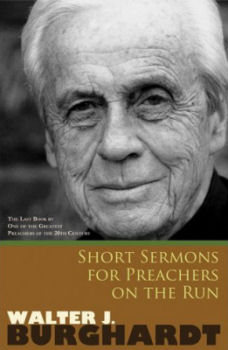
|
Posted January 29, 2010
Book: Short Sermons for Preachers on the Run Author: Walter J. Burghardt Orbis Books. Maryknoll, New York. 2009. Pp. 127 An Excerpt from the Jacket:
An Excerpt from the Book: Joy Even in Lent Laetare Sunday So if anyone is in Christ, there is a new creation: everything old has passed away; see everything has become new! All this is from God, who reconciled us to himself through Christ, and has given us the ministry of reconciliation; that is, in Christ God was reconciling the world to himself, not counting their trespasses against them, and entrusting the message of reconciliation to us. So we are ambassadors for Christ, since God is making his appeal through us; we entreat you on behalf of Christ, be reconciled to God. For our sake he made him to be sin who knew no sin, so that in him we might become the righteousness of God. 2 Cor. 5:17-21. When I began this homily, laetare (“rejoice”) was uppermost in my mind. The clear “break” with Lenten language, the optional use of rose vestments, the “joy” in the Latin subtitle, the parallel with Advent’s third Sunday. “Gaudete” (“rejoice!”) — all these together may seem to envision a one-day relaxation from the rigors of Lent. Not quite. Lent remains, but at its very heart the liturgy pauses to give us an anticipation of resurrection. To grasp this, we go back to the Scripture for glimpses of God’s generosity, of a father’s fidelity. First, to the Old Testament. The biblical book of Joshua, the successor of Moses, is important here. For “the purpose of the book is to demonstrate God’s fidelity in giving to the Israelites the land he had promised them for an inheritance.” The “promised land” is, of course, the covenant the Lord made with Abram, saying: “To your descendants I give this land, for the river of Egypt to the great river, the river Euphrates, the land of the Kenites, the Kenizzites, the Kadmonites, the Hittitess, the Perizzites, the Rephaim, the Amorites, the Canaanites, the Girgashites, and the Jebustites” (Gen. 15:18b-21_. Second, to Paul’s second letter to Corinth’s Christians. “So if anyone is in Christ, there is a new creation: everything old has passed away; see, everything has become new! All this is from God, who reconciled us to himself through Christ . . .God was reconciling the world to himself, not counting their trespasses against them . . .For our sake he made him to be sin who knew no sin, so that in him we might become the righteousness of God” (2 Cor. 5:17-21). Once again, in the very middle of Lent, absorbed by a Christ with eyes fixed on Calvary, I am subtly but clearly reminded that I trudge through these forty days as a risen Christian. I dare not pretend, even beneath the cross, that Jesus has not yet risen. Third, to a parable. The problem (relaxation or anticipation?) reaches a new level in Luke with the parable of the Lost Son. The story is familiar to you, but let me tell it with some of my own words. The younger of two sons asks and receives his inheritance from his father. With all his belongings he sets off to a far country, where he dissipates his inheritance. Hit by famine, he tends swine, does not get their food to eat, is dying of hunger. As he approaches home, his father sees him. Full of compassion, he rushes to embrace and kiss him. In the home he orders for his son the finest robe, a ring, and sandals, topped off by a celebratory feast. The older son is angry, refuses to enter the house and share in the music. He has served his father “all these years,” never disobeyed his orders. No party for him, only for the son who swallowed up his father’s property with prostitutes. The father’s response is classic — every word: “Son, you are always with me, and all that is mine is yours. But we had to celebrate and rejoice, because this brother of yours was dead and has come to life; he was lost and has been found: (Luke 15:31-32). Hardly a Gospel for a traditional Lenten day. If we focus on the happy outburst of the father in the Gospel that his son has come from death to life, as well as his excited insistence on celebration and joy — our Laetare this day could easily extend to an empty tomb. Table of Contents: Part One 1. If I have not love. . . A wedding homily 2. Love: only for two? A wedding change Part Two From Advent to Easter 3. Proximate preparation for a unique birth Guadate Sunday 4. Out of the mouths of babes A homily for Christmas Eve 5. A light, a star, an Epiphany Solemnity of the Epiphany 6. You will name him Jesus Annunciation of the Lord 7. Joy, even in Lent Laetare Suday. 8. Every day a Holy Thursday Holy Thursday 9. Let this cup pass? Holy Thursday 10. For me? Good Friday 11. Hope for the hopeless? An Easter Homily Part Three Special Feasts and Memorials 12. Receive the Holy Spirit Pentecost Sunday 13. The birth of John the Baptis John associated with Jesus always 14. Ignatius for today Feast of St. Ignatius of Loyola 15. Sanctity yesterday, sanctity today Feast of All Saints Part Four Celebrations 16. The gift of love for one another The mass for family and friends 17. Honoring conscientious objectors Expanding our vision of Veterans Day 18. Thanks be to God! Thanksgiving Day or every day? 19. A priest in every season A sixty-fifth-year homily 20. Courage in the dark A Jesuit’s diamond Jubilee 21. Jubilee for two priests Sixtieth and sixty-fifth ordination celebration Part Five Tribute 22. Scholar, author preacher Funeral homily for Walter J. Burghardt, S.J. |
|
